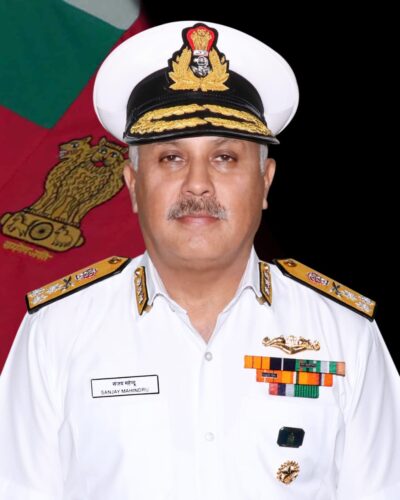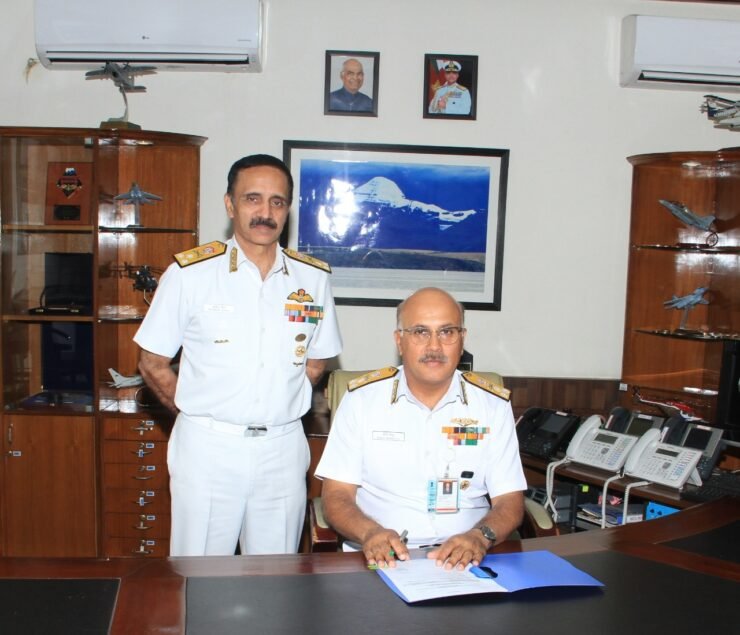 New Delhi: Vice Admiral Sanjay Mahindru, AVSM, NM assumed charge as Deputy Chief of the Naval Staff on March 31, 2022.
New Delhi: Vice Admiral Sanjay Mahindru, AVSM, NM assumed charge as Deputy Chief of the Naval Staff on March 31, 2022.
Vice Admiral Sanjay Mahindru is an alumni of the National Defence Academy, Khadakvasla. He was commissioned into the Indian Navy on January 1, 1985 and is a Submarine and Navigation Specialist.
In his career spanning over 37 years, he has held a variety of Command and Staff appointments both ashore and afloat. The Flag Officer has commanded INS Shalki, a Type 1500 Shishumar Class submarine, Cadets Training Ship INS Krishna, and Destroyer INS Rajput. He has also commanded INS Satavahana the Navy’s Submarine Training Establishment where he set up the School for Advanced Underwater Warfare. In his staff tenures he has served in the Directorate of Submarine Operations and Directorate of Nuclear Submarine Acquisition at IHQ MoD (N). He has also carried out duties as Naval Assistant to FOC-in-C (West) and FOC-in-C (South).
On promotion to the rank of Rear Admiral in 2015, he tenanted the appointments of Flag Officer Submarines & Flag Officer Maharashtra Area and Chief Staff Officer at HQSFC. On elevation to the rank of Vice Admiral in 2019, he held the challenging and coveted appointment of Deputy C-in-C of the Strategic Forces Command prior taking over the present appointment as Deputy Chief of Naval Staff at IHQ MoD (N).
He has attended the Joint Services Staff College, UK and the College of Naval Warfare Mumbai. He has a MA (Defence Studies) from Kings College, London and M Phil (Defence Studies) from Mumbai University.

The Flag Officer was awarded the Ati Vishisht Seva Medal in 2018 and Nau Sena Medal (Gallantry) in 2002, by the Hon’ble President of India.
He has succeeded Vice Admiral Ravneet Singh who retired after more than 38 years of illustrious service on March 31, 2022. During the tenure of VAdm Ravneet Singh as DCNS, the Indian Navy witnessed a number of significant achievements that have elevated India’s global maritime stature, and is a testimony of his resolve, professional competence and dedication. These include the high tempo of operations to ensure safe passage of Indian Flagged Merchant Vessels (IMFVs), Op Samudra Setu II, Op Sagar, establishing our position as ‘preferred security partner and first responder’ in IOR, a number of successful deployments of IN units in support of national effort during COVID, successful implementation of transition cycle enhancing ‘combat readiness’ of IN, credible and significant presence in Gulf of Aden deployments, maritime engagement with Friendly Foreign Countries (FFCs), implementation of new methodology of Minimum Force Level, emphasis on Tri-Service engagements towards larger objective, UN World Food Programme Escort Missions, contribution towards anti-narcotic operations, significant progress in the field of satellite surveillance and space operations in maritime domain.















